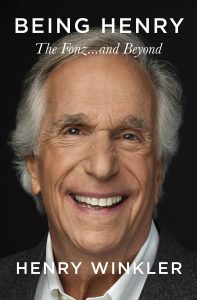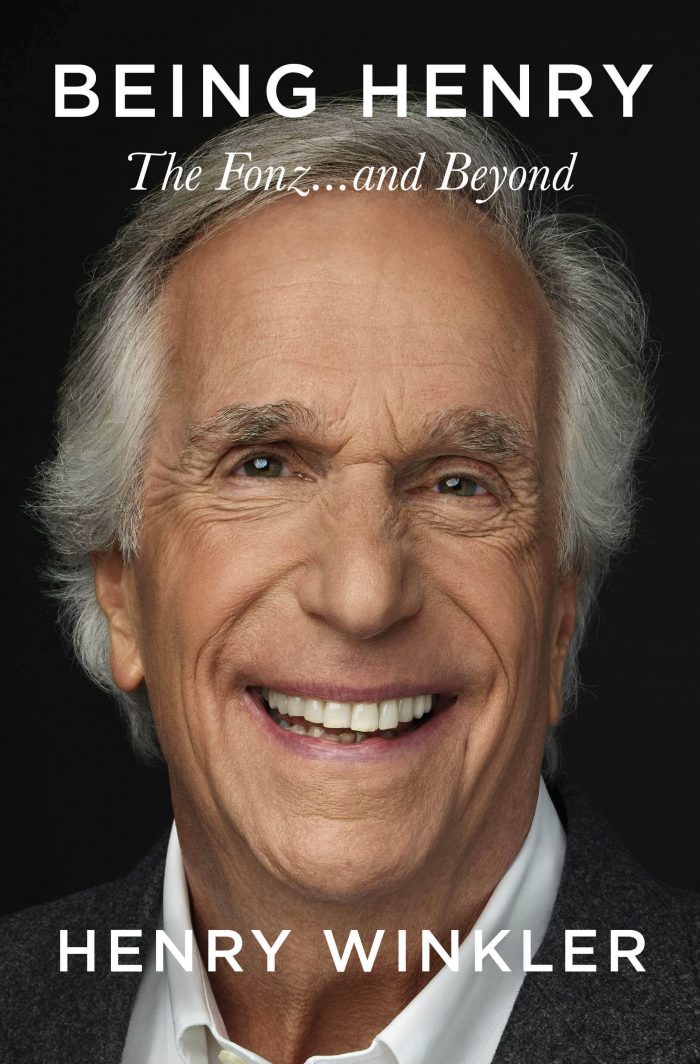Book Review: Henry Winkler reflects on his life and career in new memoir
Reviewed by Jeffrey Sanzel
“I had a couple of script pages in my hands (my palms were also good and sweaty): I had six lines to read. The show, titled Happy Days, was to revolve around a group of wholesome high school kids in 1950s Milwaukee. The character I was reading was the group’s one renegade. His name was Arthur Fonzarelli, aka the Fonz.”
Henry Winkler fittingly opens his extraordinary autobiography Being Henry (Celadon Books) with his audition for the television sitcom that would make him one of the most memorable cultural icons of the 70s. Happy Days would run for eleven seasons: Winkler (along with Tom Bosley) would appear in all 255 episodes.
But Winkler is not solely defined by this. In a nearly sixty-year career, in addition to a wide range of acting, he has been a producer, a director, a philanthropist, and a children’s book author. With Being Henry, Winkler offers an honest, engaging, and thoroughly entertaining memoir. At that heart is a man who “can’t remember not feeling an intense need to perform.”
 Born in New York City to German Jewish immigrants who fled Berlin in 1939, Winkler shares his difficult childhood with emotionally distant parents and dyslexia—undiagnosed until he was thirty-four. He “was the kid who couldn’t read, couldn’t spell, couldn’t even begin to do algebra, or geometry, or even basic arithmetic.” His failing grades led to humiliation; his parents referred to him as dummer Hund—dumb dog. With these challenges, he marvels at graduating from high school and college (a BA in drama from Emerson College, with a minor in psychology) and a Masters in acting (Yale School of Drama).
Born in New York City to German Jewish immigrants who fled Berlin in 1939, Winkler shares his difficult childhood with emotionally distant parents and dyslexia—undiagnosed until he was thirty-four. He “was the kid who couldn’t read, couldn’t spell, couldn’t even begin to do algebra, or geometry, or even basic arithmetic.” His failing grades led to humiliation; his parents referred to him as dummer Hund—dumb dog. With these challenges, he marvels at graduating from high school and college (a BA in drama from Emerson College, with a minor in psychology) and a Masters in acting (Yale School of Drama).
From there, he paints a portrait of a struggling New York actor working in commercials to support low and non-paying theatre. His film break came with The Lords of Flatbush. Soon after, he moved to Hollywood, making a memorable guest appearance on The Mary Tyler Moore Show. Continuing through rounds of auditions and disappointments, he landed the role of Fonzie when he was twenty-eight.
The career-defining rebel eventually became a bit of a trap, but Winkler shows enormous gratitude for Happy Days. He is particularly generous in praise of his colleagues on both sides of the camera. He is forthcoming about his relationship with the cast, especially Ron Howard, who was the original focus of the series. Howard’s frustration with the shift from ensemble to a Fonzie-centered show moved him towards his directorial pursuits. Winkler and Howard maintained a personal and professional relationship, with projects spanning from Night Shift to Arrested Development.
He claims many of his initial movie jobs came from fame and not necessarily talent; he spent years trying to escape the shadow of the Happy Days persona. “The truth was that the Fonz aside, I was half-baked as an actor. Self-conscious.” Few performers are as brave and self-reflective.
Winkler is honest about his insecurities, his frugality, and even his occasions of obliviousness. He addresses the double-edged dangers of stardom. He talks about his verbosity, which increases when he is insecure or nervous. He admits when he feels disconnected or unsure, he talks too much.
He finds humor in his early failed romantic forays and smartly lets his wife, Stacey, speak for herself in various junctures in the book’s narrative. He does not shy away from his guilt and frustrations with intimacy and communication, something he did not fully deal with until therapy in the last decade. (He has been married to Stacey since 1978. He helped raise a son from her first marriage, and they have two children together. In addition, they have six grandchildren).
After the Happy Days run, he did not act for seven years. Rather than retreating, he embarked on new vistas. He started a production company, began directing, and developed into a sought-after voice artist. Years later, he added best-selling children’s author, collaborating on twenty-eight “Hank Zipzer” novels about an elementary school student with dyslexia. The books became a well-received television series.
Eventually, his acting career blossomed again. Scream, The Water Boy, and Royal Pains, along with “a string of authority figures lacking authority,” were hallmarks in later years. He returned to the stage, appearing in two Broadway productions, including a Neil Simon premiere.
His most recent sensation, HBO’s Barry, rewarded him with a much-deserved Primetime Emmy Award. (Note: He had already received two Daytime Emmy Awards.)
Winkler analyzes his initial meteoric fame and values its many gifts; he remains humble in his over half a century of remarkable and unique achievements. He is philosophical, embracing “that you couldn’t have known then what you know now. That only the process of living gets you there: you must do the work in order to eat the fruit of growing—of being.”
Henry Winkler’s beautiful account is, of course, a book for Happy Days fans. But it is also for readers seeking to understand the world of show business as told through a transparent and often profound narrator. And finally, Being Henry should be read by every actor or artist who has ever questioned their own value.
Being Henry: The Fonz…and Beyond is available on Amazon and at your local Barnes and Noble bookstore.







